Only Connect
‘A person is a person because of people’ African saying
When it comes to artistic talent, I am a non-starter. As a practitioner that is. My skills in that regard lie in appreciating the work of others, in any medium. Joining Cape Farewell, therefore, is a real treat for me. As I haven’t seen much of their work, I cannot judge just how good they are, but from their lively and passionate descriptions of the projects they are doing, they can’t be bad!
We are here to consider the purpose of Cape Farewell, which as I understand it is to help participants talk about and connect to people and place around the Scottish Islands. The central idea, says our team leader Ruth Little, is stewardship. As someone who has devoted most of their life to talking about and trying to connect people to the idea of sustainable development, this sounds good to me. Sustainable development means trying to achieve our environmental, social and economic goals, at the same time – it being the at-the-same-timeness that matters. We are in a pickle because we have forgotten how to do this togetherness stuff, allowing trade-offs that persistently favour the economy over people and the environment.
Most of the world, however, knows the dangers of such trade-offs – especially in poorer areas where survival economics rules. Degrade the environment and people suffer – in person and economically.
Isolated communities in the UK, like those in the Scottish islands, also understand how intimately their well-being depends on a healthy environment. Writing this blog off the shore of the uninhabited (since 1912) island of Mingulay, where artist Julie Brooks and her family are camping for the summer, it is good to reflect on the way people have populated the islands down the centuries, and what the current pressure on land and resources from an overpopulated world mean for the future. For example Mingulay used to support 150 people in 1880 (0 in 2001), Canna 119 (12), and the much bigger Skye 17,000 (9000). As pressure on land and resources in the UK – and globally – increases, will more people seek to settle in relatively sparsely populated Scotland, and specifically in the more remote areas? And what will that mean for governance? At the moment, the small isles (where we are sailing) Canna , Rum, Muck and Eigg all have different models of ownership and management: respectively Scottish National Trust, Scottish Natural Heritage, private, respectively.
A favourite slogan of the environmental movement is ‘think globally and act locally’, but how would this work in practice? Our interconnectedness has never been more apparent, for example: oil and food prices; financial markets; the way pollution generated in Europe finds its way into the snow and animal tissues of the Arctic and Antarctic; how tackling global warming will require concerted and just action from rich and poor alike. So agreements on what to do and how to do it will have to be reached at all levels – from community councils as well as international organisations. Former UK Ambassador to the UN, Jeremy Greenstock, points out that global security is an aggregate of resilient local communities. It is only there that terrorism and dangerous climate change can be defeated.
There is a danger that the trend to ‘localism’ will turn into begger-my-neighbour behaviour, more like the ancient tribalism that ruled in the Highlands and Islands and still grips many other countries. Canna, is struggling to maintain a viable community (the loss of one family led to the closing of the school) yet there is a reluctance to ‘dilute’ the hebridean culture and build the homes that will enable new people to join the community. Pragmatism may well win in the end, but then how does Canna and its neighbouring islands interconnect with each other, the rest of the UK and the world beyond, in a way that delivers the resilient, secure way of life everybody wants? Where stewardship of the land and each other is purpose of what Adam Smith called the ‘toil and bustle’ of everyday life. Bananas, coffee and cocoa beans don’t grow here but are found in local shops. So what about the communities that do grow them and export their cash crops to rich countries? How resilient are they? As we snap off a piece of chocolate, how many of us even ask that question?
We ‘do’ fair-trade, but does a fair price for producers mean we do the sort of trade that favour products from communities that are locally resilient and don’t depend on our shopping habits to survive? I know villages in Ghana where growing pineapples for export is the principle economic activity. Canna cannot be self-sufficient without going back to the grim existence of 200 years ago, but what is the ‘right’ proportion of trade or any other sort of relationship with nearby islands, with mainland Scotland, Europe and the rest of the world? How does the interdependency that will determine whether we manage to avert the worst of the environmental and social upheavals that loom become a practical reality?
More questions than answers for me from our trip so far, but a deepening of concerns that I have been mulling over for some time. The US and European security ‘think tanks’ have just produced a report examining the sort of governance institutions and processes we need to tackle the big, ‘wickedly’ complex problems of the 21st century. Can we cascade a similar critical appraisal down through our nation states to our local communities? A good analogy is the sort of grids we need to access heat, power and light (energy services) in a hyper-efficient, low carbon way. Local grids go in where people live, able to use diverse generation possibilities that suit the local geography. Eigg, for example uses a mix of wind, solar and micro-hydro power. Key to resilience of supply though is the interconnections between local grids so that they support each other if something goes wrong somewhere. A similar model of local governance should be possible, where local communities are resilient, not because they think they can go it alone (they can’t), but because they are active in the way they interconnect with each other, not only locally, but globally too. I know the woman who grows my bananas, and my enjoyment of them is enhanced by the knowledge that she lives in a community that is equally resilient – environmentally, socially and economically.
So as we set sail to Barra via the cliffs of Mingulay and the world renowned colonies of sea birds, watch basking sharks and enjoy the company of some of the wonderful people who live and visit here, I hope we will also dwell on the global interdependency that makes protecting this environment and sustaining its people possible. And pause to ponder how to strengthen it rather than try to live as if it didn’t matter.
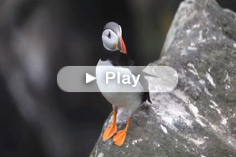

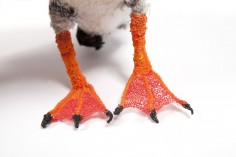
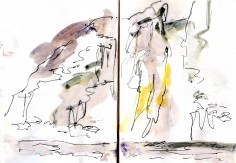
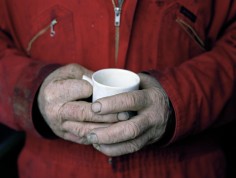
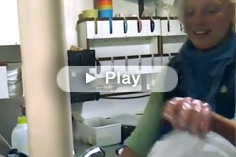
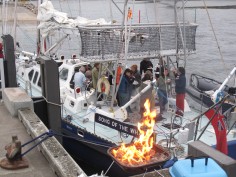
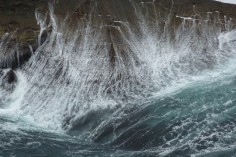
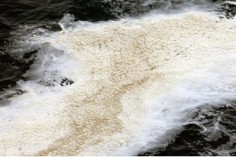
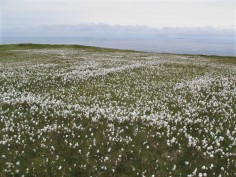
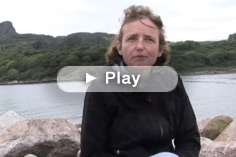
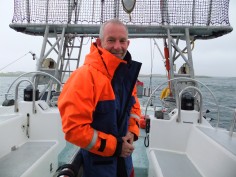








No Comments